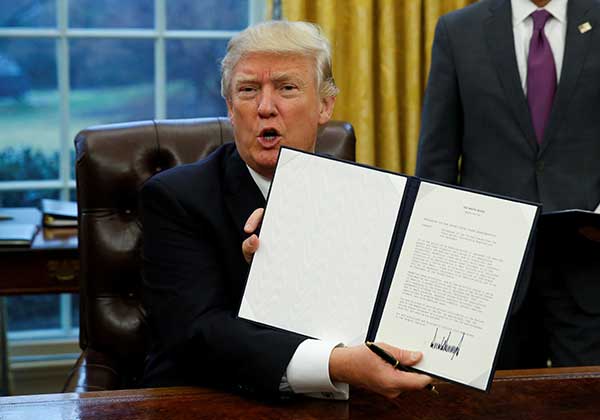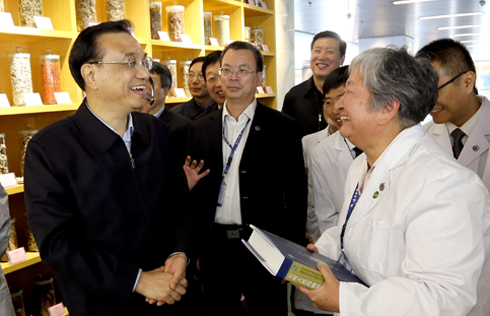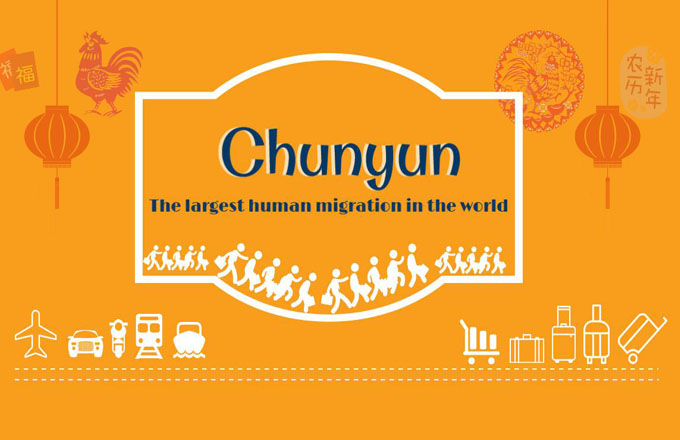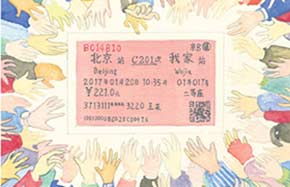China to push for two regional pacts as US quits TPP
 |
|
US President Donald Trump holds up his executive order on withdrawing from the Trans-Pacific Partnership after signing it in the Oval Office of the White House in Washington, DC, on Monday.[Photo/Agencies] |
Beijing said on Tuesday that it will support ongoing deliberation of two free trade arrangements in the Asia-Pacific region after the United States quit the Trans-Pacific Partnership.
US President Donald Trump signed an executive order on Monday to withdraw the country from the TPP, a trade agreement that his predecessor Barack Obama had hoped would become his legacy.
The 12-member TPP-a trade pact among countries around the Pacific Ocean-has excluded China.
Beijing has been an advocate of two other free-trade pacts-the Regional Comprehensive Economic Partnership and the Free-Trade Agreement of the Asia-Pacific.
When asked to comment on the US decision to quit the TPP, Foreign Ministry spokeswoman Hua Chunying said China will stay committed to pressing ahead with the economic integration process in the Asia-Pacific region.
China endorses open, transparent and mutually beneficial free trade agreements, and trade rules "should be jointly settled through consultations on equal footing", Hua said.
Beijing will further promote the negotiation of the Regional Comprehensive Economic Partnership, since the negotiations have brought key progress and should be completed at an early date, Hua said.
Also, the building of the Asia-Pacific free-trade zone should be further advanced, since leaders of Asia-Pacific Economic Cooperation member economies have agreed on a vision and a plan for this, according to Hua.
Some observers and media have said the Trump administration's quitting the TPP will give China more chances to play a bigger role and even assume political or economic leadership in international affairs.
In response, the spokeswoman said the word "duty" is more accurate than "leadership".
China is willing to work with all parties to "jointly weather the storm", and take on its own duty of solving various problems facing the world, Hua said.
David Dollar, a senior fellow at the John L. Thornton China Center of the Brookings Institution, said Trump's withdrawal from the TPP signals a turning away from Asia.
Teng Jianqun, director of the Department of American Studies at the China Institute of International Studies, said that when the US refuses to assume its due role in boosting global free trade, China should "take its respective duty that fits its capacity".
But China will not take charge of everything, as "that goes beyond its capacity, and the international community will not accept that scenario either", Teng said.
Trump's quitting the TPP may bring some short-term benefits for the US, such as tangible profits and more jobs, but the long-term prospect may be a problem, according to Teng.
Zhong Feiteng, senior researcher on Asia-Pacific studies at the Chinese Academy of Social Sciences, said China, before supporting the two free trade agreements in the Asia-Pacific region, reflected on the US strategy on regional cooperation. China concluded that "unopen and exclusive arrangements are not right choices", Zhong said.
"As Washington is taking steps back home and reinforcing its domestic development, China enjoys strong impetus for a new type of regional cooperation, and the region is also expecting a bigger role for China," Zhong added.
Wang Qingyun in Beijing contributed to this story.



















